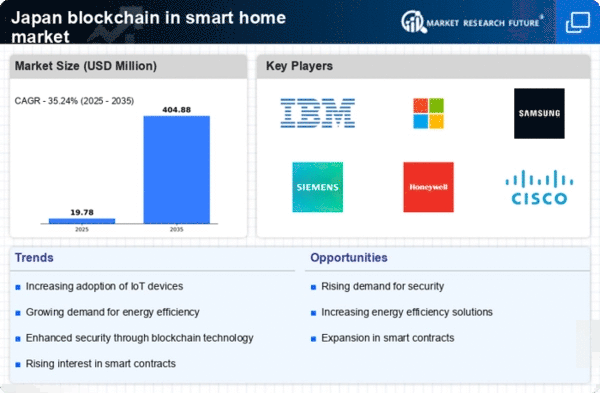Rising Cybersecurity Concerns
The escalating concerns regarding cybersecurity in Japan are propelling the blockchain in-smart-home market forward. With the proliferation of connected devices, vulnerabilities to hacking and data breaches have become more pronounced. Blockchain technology offers a decentralized and secure framework that can mitigate these risks. Recent studies indicate that nearly 60% of Japanese consumers express apprehension about the security of their smart home devices. This growing awareness is likely to drive demand for blockchain solutions that enhance data integrity and user privacy, thereby fostering greater consumer confidence in smart home technologies.
Consumer Awareness and Education
Consumer awareness and education regarding blockchain technology are gradually increasing in Japan, serving as a vital driver for the blockchain in-smart-home market. As more individuals become informed about the benefits of blockchain, such as enhanced security and transparency, the demand for blockchain-enabled smart home solutions is likely to rise. Educational initiatives by tech companies and government bodies are fostering a better understanding of how blockchain can improve smart home ecosystems. This growing knowledge base may lead to a more informed consumer base that actively seeks out blockchain solutions, thereby propelling market growth.
Growing Demand for Smart Home Automation
The increasing demand for smart home automation in Japan is a pivotal driver for the blockchain in-smart-home market. As consumers seek enhanced convenience and efficiency, the integration of blockchain technology offers a secure and transparent method for managing smart devices. According to recent data, the smart home market in Japan is projected to reach approximately $20 billion by 2026, with a compound annual growth rate (CAGR) of around 15%. This growth is likely to spur investments in blockchain solutions that facilitate seamless device communication and data management, thereby enhancing user experience and trust in smart home systems.
Regulatory Support for Blockchain Technology
Regulatory frameworks in Japan are increasingly supportive of blockchain technology, which serves as a significant driver for the blockchain in-smart-home market. The Japanese government has recognized the potential of blockchain to enhance security and efficiency in various sectors, including smart homes. Initiatives aimed at fostering innovation and ensuring consumer protection are likely to encourage the adoption of blockchain solutions. As of 2025, the government has allocated over $100 million to support blockchain research and development, which may lead to more robust applications in smart home environments, ultimately benefiting consumers and businesses alike.
Increased Investment in Smart Home Technologies
Investment in smart home technologies is witnessing a notable surge in Japan, which is a crucial driver for the blockchain in-smart-home market. Venture capital funding for smart home startups has increased by over 30% in the past year, reflecting a strong interest in innovative solutions that incorporate blockchain. This influx of capital is expected to accelerate the development of advanced smart home applications that leverage blockchain for improved functionality and security. As the market matures, the integration of blockchain technology is likely to become a standard feature, enhancing the overall value proposition for consumers.
















